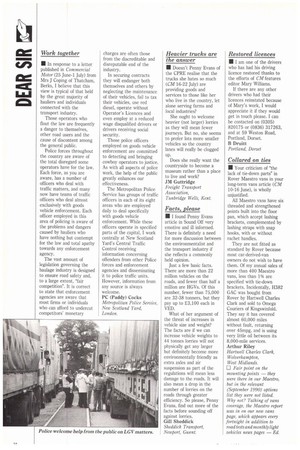• In response to a letter published in Commercial Motor
Page 36

If you've noticed an error in this article please click here to report it so we can fix it.
(25 June-1 July) from Mrs .1 Coping of Thatcham, Berks, I believe that this view is typical of that held by the great majority of hauliers and individuals connected with the transport industry.
Those operators who flout the law are frequently a danger to themselves, other road users and the cause of discontent among the general public.
Police forces throughout the country are aware of the total disregard some operators have for the law. Each force, as you are aware, has a number of officers who deal with traffic matters, and many now have teams of traffic officers who deal almost exclusively with goods vehicle enforcement. Each officer employed in this area of policing is aware of the problems and dangers caused by hauliers who have nothing but contempt for the law and total apathy towards any enforcement agency.
The vast amount of legislation governing the haulage industry is designed to ensure road safety and, to a large extent, 'fair competition". It is correct to state that enforcement agencies are aware that most firms or individuals who can afford to undercut competitors' monetary charges are often those from the discreditable and disreputable end of the industry.
In securing contracts they will endanger both themselves and others by neglecting the maintenance of their vehicles, fail to tax their vehicles, use red diesel, operate without Operator's Licences and even employ at a reduced wage disqualified drivers or drivers receiving social security.
Those police officers employed on goods vehicle enforcement are committed to detecting and bringing cowboy operators to justice. As with all aspects of police work, the help of the public greatly enhances our effectiveness.
The Metropolitan Police Service has groups of traffic officers in each of its eight areas who are employed daily to deal specifically with goods vehicle enforcement. While these officers operate in specified parts of the capital, I work centrally at New Scotland Yard's Central Traffic Control receiving information concerning offenders from other Police forces and enforcement agencies and disseminating it to police traffic units. However, information from any source is always welcome.
PC (Paddy) Cocks Metropolitan Police Service, New Scotland Yard, London.
Heavier trucks are the answer
• Doesn't Penny Evans of the CPRE realise that the trucks she hates so much (CM 16-22 July) are providing goods and services to those like her who live in the country, let alone serving farms and local industries?
She ought to welcome heavier (not larger) lorries as they will mean fewer journeys. But no, she seems to prefer lots more smaller vehicles so the country lanes will really be clogged up.
Does she really want the countryside to become a museum rather than a place to live and work?
JM Guttridge
Freight Transport Association, Tunbridge Wells, Kent.
Facts, please
• I found Penny Evans article in Sound Off very emotive and ill informed. There is definitely a need for more discussion between the environmentalist and the transport industry if she reflects a commonly held opinion.
Just a few basic facts. There are more than 22 million vehicles on the roads, and fewer than half a million are HGVs. Of this number, fewer than 75,000 are 32-38 tanners, but they pay up to £3,100 each in VED.
What of her argument of the threat of increases in vehicle size and weight? The facts are if we can increase vehicle weights to 44 tonnes lorries will not physically get any larger but definitely become more environmentally friendly as extra axles and air suspension as part of the regulations will mean less damage to the roads. It will also mean a drop in the number of lorries on the roads through greater efficiency. So please, Penny Evans, find out more of the facts before sounding off against lorries.
Gill Sheddick
Sheddick Transport, Newport, Gwent.
Restored licences
• I am one of the drivers who has had his driving licence restored thanks to the efforts of CM features editor Mary Williams.
If there are any other drivers who had their licences reinstated because of Mary's work, I would appreciate it if they would get in touch please. I can be contacted on (0305) 820175 or (0836) 317263, and at 59 Weston Road, Portland, Dorset.
B Druitt Portland, Dorset
Collared on ties
• Your criticism of "the lack of tie-down parts" in Rover Maestro vans in your long-term vans article (CM 10-16 June), is wholly unjustified.
All Maestro vans have six threaded and strengthened points built into the floor pan, which accept lashing brackets, complemented by lashing straps with snap hooks, with or without rachet handles.
They are not fitted as standard by Rover because most car-derived-van owners do not wish to have them. Of my annual sales of more than 400 Maestro vans, less than 1% are specified with tie-down brackets. Incidentally, H382 GAC was bought from Rover by Hartwell Charles Clark and sold to Omega Couriers of Kingswinfold. They say it has covered almost 60,000 miles without fault, returning over 45mpg, and is using very little oil between its 8,000-mile services. Arthur Riley Hartwell Charles Clark, Wolverhampton, West Midlands.
O Fair point on the mounting points — they were there in our Maestro, but in the relevant (September 1990) options list they were not listed. Why not? Talking of vans coverage, the Maestro report was in on our new vans page, which appears every fortnight in addition to road tests and monthly light vehicles news pages — Ed.












































































